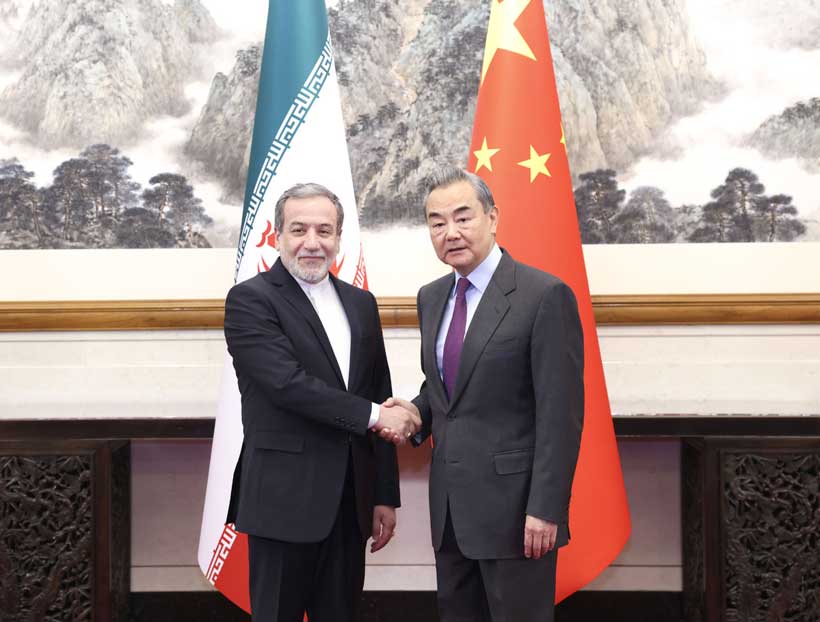The recent visit of Iran’s Foreign Minister to China comes at a pivotal moment in Middle Eastern and global politics. With tensions escalating in the region due to the Israel-US axis and growing instability, this high-profile diplomatic engagement underscores the strategic importance of Iran-China relations. These two ancient civilizations, bound by shared interests and common challenges, are forging a partnership that holds profound implications for regional stability and global politics.
A History of Cooperation and Shared Vision
Iran and China’s relationship is deeply rooted in history. For centuries, the ancient Silk Road connected their peoples, facilitating trade, cultural exchange, and collaboration. In modern times, the ties have evolved into a robust partnership driven by mutual respect and a shared commitment to sovereignty and self-determination.
The 25-year Comprehensive Strategic Partnership Agreement signed in 2021 has cemented these ties further, paving the way for expanded cooperation in energy, infrastructure, technology, and security. This long-term agreement underscores the strategic depth of their relationship and reflects a mutual desire to navigate a multipolar world where no single power dominates.
Convergence of Interests
At the heart of Iran-China relations lies a convergence of interests that transcends regional boundaries:
Energy and Trade:
Iran, with its vast energy resources, is a natural partner for China, the world’s largest energy consumer. China’s Belt and Road Initiative (BRI) aligns seamlessly with Iran’s strategic location, making it a critical node in connecting Asia, the Middle East, and Europe.
Regional Stability:
Both nations seek to counter external interference in the Middle East and maintain regional stability. Iran plays a key role in securing energy routes, while China’s diplomatic and economic engagements promote peace and development.
Global Sovereignty:
As nations often targeted by Western sanctions and interference, Iran and China share a commitment to defending their sovereignty and resisting unilateralism. This shared challenge strengthens their resolve to build a cooperative framework independent of Western pressures.
Common Challenges from the West
Iran and China face significant challenges from the Western world, including sanctions, economic containment, and political pressure. The United States, in particular, has sought to isolate both nations, using economic tools and military alliances to maintain its dominance.
- Sanctions: Iran has endured decades of crippling sanctions, while China faces technology restrictions and trade barriers.
- Military Encirclement: The US maintains military bases near both nations, posing a direct challenge to their security.
- Media Narratives: Both countries contend with biased portrayals in Western media, aimed at undermining their global standing.
- These shared challenges create a natural synergy for cooperation and a unified stance against external pressures.
Significance of Iran-China Relations to Regional and Global Politics
The strengthening of Iran-China ties carries immense significance for the Middle East and beyond:
A New Regional Balance:
As the Middle East faces volatility, Iran-China collaboration offers a stabilizing influence. China’s balanced diplomacy and Iran’s strategic position can promote dialogue and reduce tensions.
Economic Transformation:
China’s investments in Iran, from infrastructure to technology, can rejuvenate Iran’s economy and create opportunities for regional connectivity. This aligns with China’s broader vision of shared prosperity through the BRI.
A Multipolar World Order:
Iran and China’s partnership exemplifies the shift toward a multipolar world, where cooperation among nations counters unilateral dominance. Their alignment sends a clear message: regional and global stability must be built on inclusivity, respect, and mutual benefit.
Emerging Scenarios in the Middle East
The Middle East stands at a crossroads. With escalating hostilities, the role of external powers like the US and Israel has deepened divisions. In this context, Iran-China relations provide a counterbalance to the forces of instability.
China’s principled stance on non-interference and its emphasis on diplomacy contrast sharply with the militaristic approaches of Western powers. By supporting initiatives like the Iranian Foreign Minister’s recent visit, China signals its commitment to fostering dialogue and reducing tensions in the region.
A Future of Promise and Partnership
Looking ahead, the Iran-China relationship holds immense potential:
- Energy Cooperation: As sanctions ease, Iran could become a leading energy supplier for China, ensuring mutual economic benefits.
- Technological Collaboration: Joint ventures in technology and innovation can position both nations at the forefront of global advancements.
- Cultural Exchange: People-to-people ties will further strengthen mutual understanding, building a robust foundation for long-term cooperation.
Summary
Iran and China’s partnership transcends the boundaries of a traditional bilateral relationship, standing as a symbol of resistance against hegemony and a beacon of hope for a more equitable and inclusive world order. In an era marked by shifting global dynamics and mounting challenges, their collaboration reflects an unwavering commitment to resilience, innovation, and the pursuit of shared prosperity.
This partnership embodies a vision where nations, regardless of external pressures, assert their sovereignty and craft their destinies. It challenges the longstanding structures of unilateralism and underscores the necessity of fostering a multipolar global system rooted in mutual respect and balanced growth. Iran and China’s alliance is not merely a reaction to shared adversities but a proactive step toward building a future grounded in inclusivity and fairness.
As the Middle East grapples with an uncertain and often volatile landscape, the deepening relationship between Iran and China serves as a stabilizing force. In a region where external interventions have historically exacerbated tensions, their strategic partnership offers an alternative model based on dialogue, development, and diplomacy. By leveraging their economic, political, and cultural strengths, Iran and China are crafting pathways to progress that prioritize regional harmony and global stability.
Together, they are not just addressing the pressing challenges of the present but also charting a transformative course for the future. This future envisions a world order that values collaboration over conflict, sovereignty over subjugation, and shared growth over dominance. Iran and China’s partnership stands as a testament to the power of collective determination, promising a tomorrow defined by peace, prosperity, and mutual progress.
